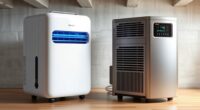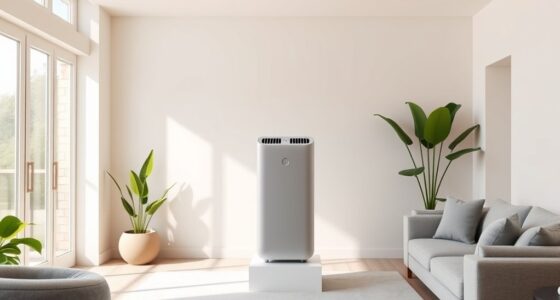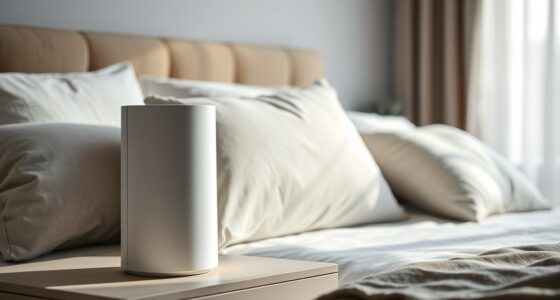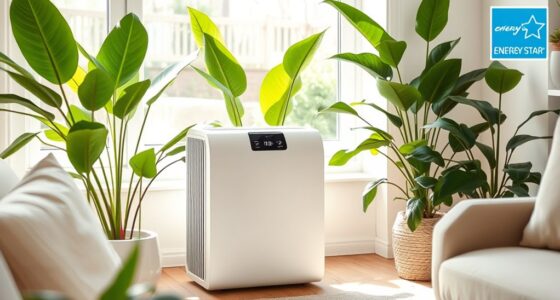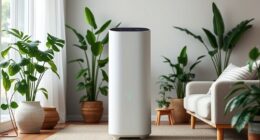HEPA ratings, like H10, H13, and H14, show how well a filter captures tiny airborne particles. H10 offers basic filtration, suitable for larger particles, while H13 filters remove 99.95% of particles, and H14 filters trap 99.995%, providing the highest performance. Choosing the right one depends on your air quality needs and environment. If you want to understand how these ratings can improve your indoor air, keep exploring more details.
Key Takeaways
- H10 filters trap at least 85% of airborne particles, suitable for basic air filtration needs.
- H13 filters capture 99.95% of tiny particles, ideal for improved indoor air quality.
- H14 filters provide 99.995% filtration, offering the highest performance for sensitive environments.
- Higher ratings (H13, H14) typically have longer lifespans due to increased particle trapping capacity.
- Choosing the right rating depends on your air quality requirements and the level of filtration needed.
Understanding HEPA Filtration Standards and Ratings
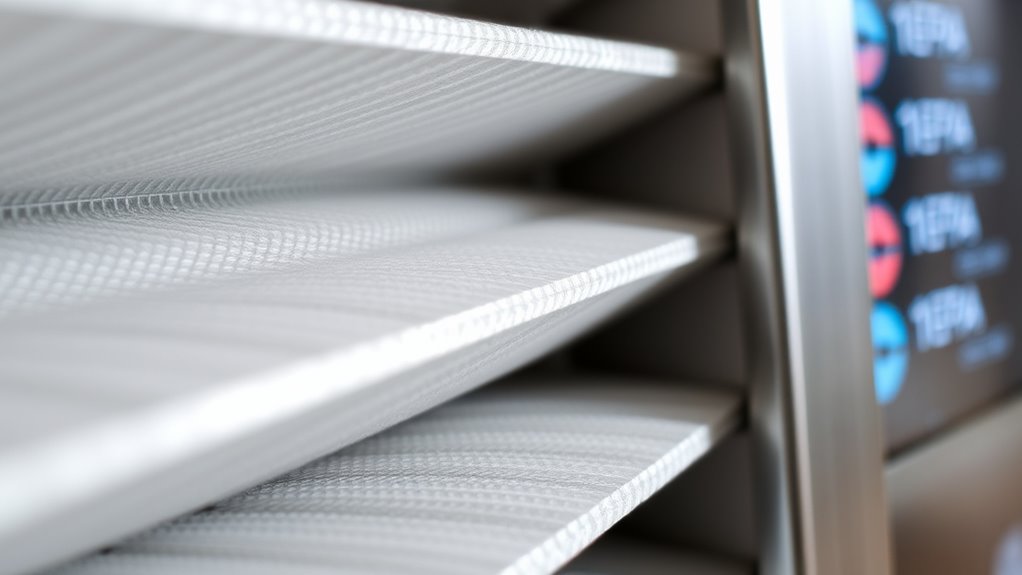
Understanding HEPA filtration standards and ratings is essential if you want to choose the right air purifier or filter. These standards determine how effectively a HEPA filter can improve air quality by capturing tiny particles like dust, pollen, and allergens. HEPA ratings, such as H10, H13, and H14, indicate different levels of filtration efficiency, with higher numbers filtering out more particles. Knowing these ratings helps you select a filter that meets your air quality needs. Additionally, understanding the standards guides you in proper filter maintenance, ensuring your device continues to perform at its best. Regular filter replacement or cleaning is vital to maintain high filtration efficiency and avoid a decline in air quality. Clear knowledge of these ratings empowers you to make informed decisions for healthier indoor environments. Understanding HEPA standards can also help you interpret related certifications and guarantees, ensuring you choose the most effective filters.
Comparing Efficiency: H10, H13, and H14 Performance Levels
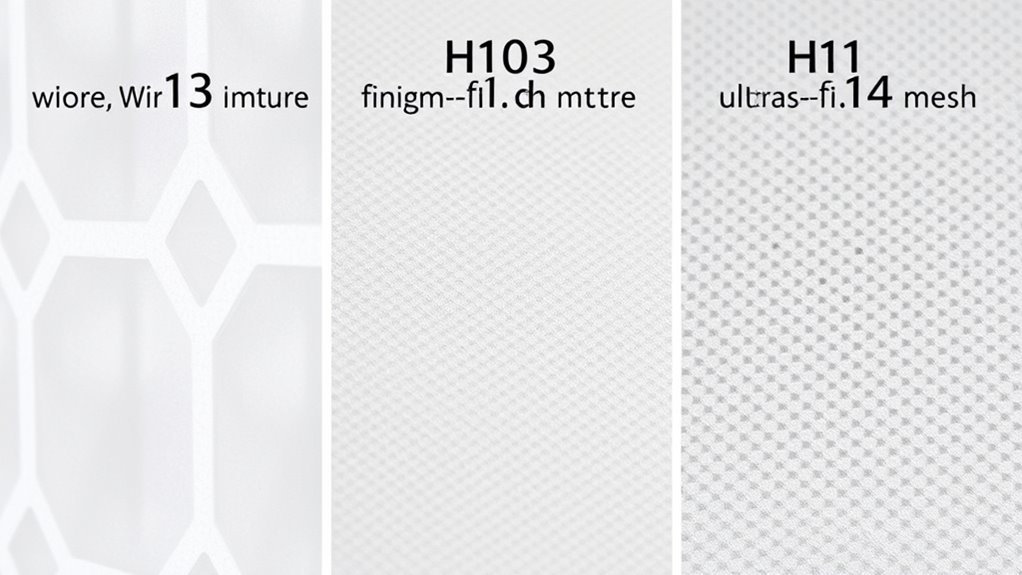
When comparing HEPA filter ratings like H10, H13, and H14, it’s important to recognize how each level performs in capturing airborne particles. H10 filters offer basic filtration, suitable for larger particles, with moderate airflow dynamics and a shorter filter lifespan. H13 filters provide a higher efficiency, capturing 99.95% of particles, which improves air quality and maintains steady airflow. H14 filters deliver even superior performance, filtering 99.995% of airborne contaminants, making them ideal for sensitive environments. As filter efficiency increases, airflow dynamics become more critical, and you might notice slight reductions in airflow speed. Additionally, higher-rated filters generally have longer lifespans because they trap more particles before needing replacement. Understanding these differences helps you choose the right filter based on your air quality needs and maintenance expectations. The HEPA filter standards are continually evolving to meet stricter safety and health requirements.
Choosing the Right HEPA Filter for Your Environment
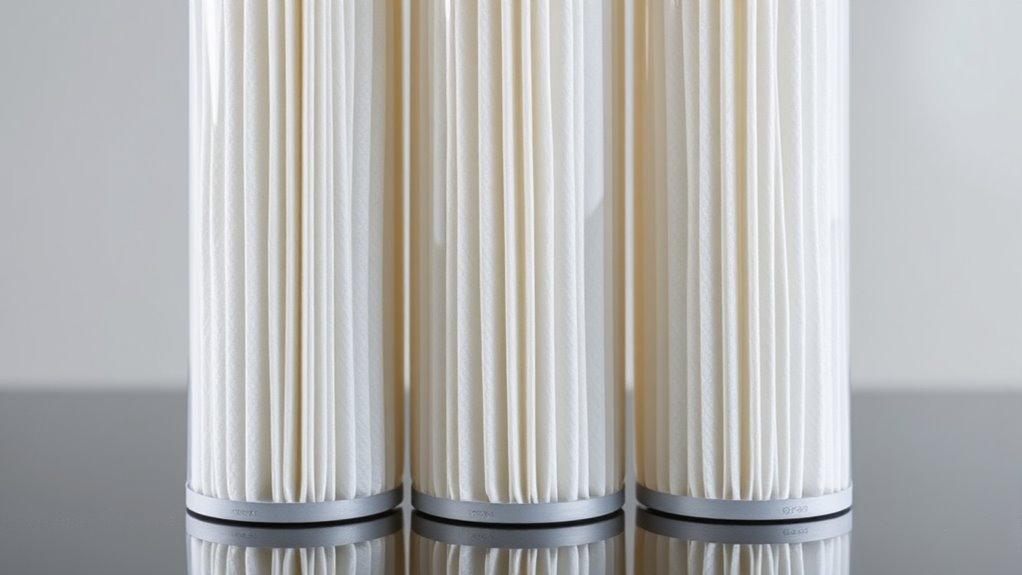
Choosing the right HEPA filter depends on your specific environment and air quality needs. Start by evaluating your space with air quality sensors, which help identify pollutants, allergens, or particulates present. If you’re in a high-traffic area or dealing with severe air issues, opt for filters with higher efficiency ratings like H13 or H14. Consider how often you’ll need to perform filter maintenance—some filters require more frequent changes to maintain best performance. For environments with sensitive occupants, such as hospitals or cleanrooms, regular filter checks and timely replacements are vital. Matching the filter’s capabilities to your environment ensures cleaner air and better health outcomes. Properly tuning your air filtration system, much like Kia Tuning, can optimize performance and longevity. Always follow manufacturer guidelines for maintenance and replacement schedules to keep your HEPA system working effectively.
Frequently Asked Questions
Are HEPA Filters Effective Against Viruses and Bacteria?
Yes, HEPA filters are effective against airborne pathogens like viruses and bacteria because they trap particles as small as 0.3 microns. This includes many bacteria and some viruses. Keep in mind, though, that filter lifespan matters; over time, filters can become less efficient. Regularly replacing or maintaining your HEPA filter guarantees it continues to effectively combat airborne pathogens, keeping your air cleaner and safer.
How Often Should HEPA Filters Be Replaced?
You should replace your HEPA filter based on its filter lifespan and replacement frequency recommendations, usually every 6 to 12 months. Regularly check for signs of dirt buildup or reduced airflow, which indicate it’s time for a change. Proper maintenance ensures peak filtration efficiency, helping you breathe cleaner air. Keep track of usage and follow the manufacturer’s guidelines to maintain your filter’s effectiveness and indoor air quality.
Can HEPA Filters Remove Odors and Gases?
HEPA filters mainly remove airborne particles, so they aren’t effective for odor absorption and gas removal. To target odors and gases, you’ll want filters with activated carbon or charcoal layers. These specialized filters trap and neutralize smells and harmful gases, improving air quality. So, if you’re concerned about odors or gases, look for filters designed specifically for gas removal, not just standard HEPA filters.
Do HEPA Filters Require Special Maintenance?
You might wonder if HEPA filters need special maintenance. Typically, they require minimal upkeep, but you should check the filter lifespan and replace it when it gets clogged or after a set period. Regular maintenance procedures include turning off the system, carefully removing the filter, and installing a new one. This guarantees peak performance and air quality, preventing buildup of dust and allergens that can hinder filter efficiency.
Are HEPA Filters Suitable for Industrial or Commercial Use?
You might think HEPA filters are only for homes, but they’re actually perfect for industrial applications and commercial installations. These filters effectively trap tiny particles, making workplaces safer and cleaner. They’re designed to handle high airflow and pollutant loads, so you can trust them in demanding environments. Whether in manufacturing, healthcare, or laboratories, HEPA filters provide reliable air purification, ensuring your space meets strict cleanliness standards.
Conclusion
Choosing the right HEPA filter depends on your needs. For example, if you’re allergy-prone, an H13 filter can markedly reduce airborne allergens. Imagine a small clinic upgrading from H10 to H13 filters—air quality improves, patient comfort rises. Understanding these ratings helps you make informed decisions, ensuring you get the right level of filtration for your space. So, assess your environment carefully, and pick the HEPA filter that keeps your air clean and safe.

